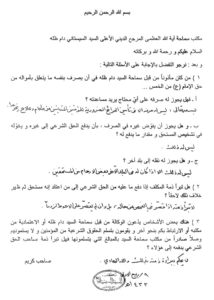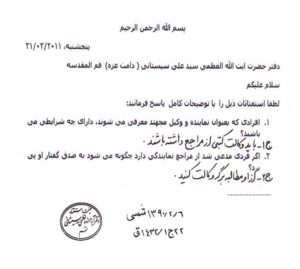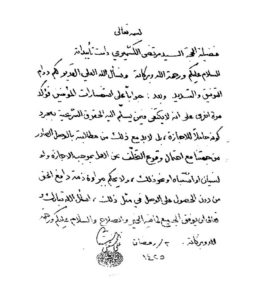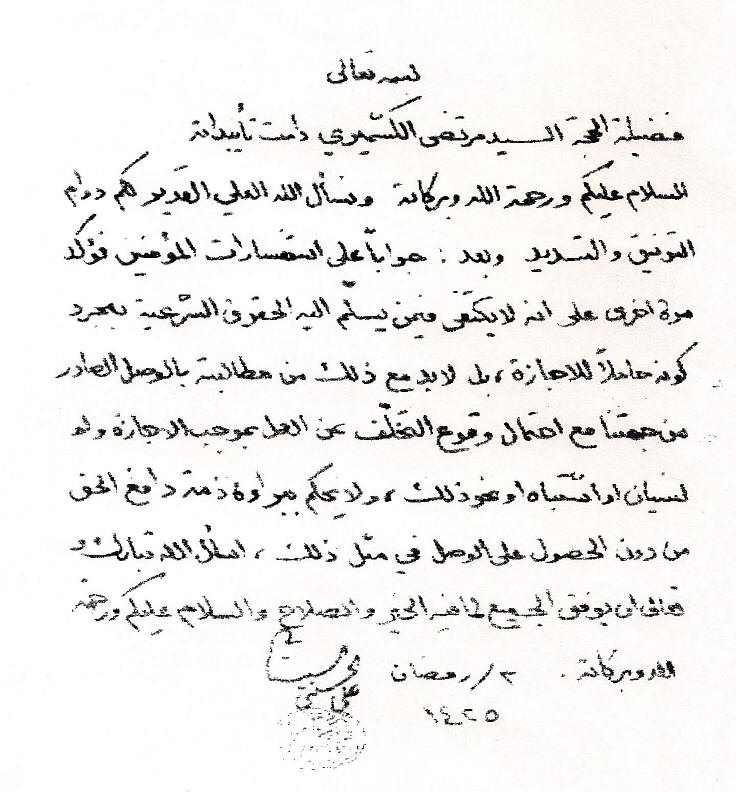PAYMENT OF KHUMS -FATWA FOR KHUMS GIVER TO INSIST ON
MARJAS RECIEPT
https://www.imam-us.org/khums-conditions-and-receipt/
If an official receipt is not issued or conditions are not
met, khums is still due
The following is the official legal opinion (fatwa) from his eminence,
Sayyid al-Sistani, in response to questions on the spending and handling of
khums dues as well as the necessity of an official religious receipt.
 In
the Name of Allah, the Compassionate, the Merciful
In
the Name of Allah, the Compassionate, the Merciful
To the Office of Grand Ayatollah Sayyid Al-Sistani:
May the Peace, Mercy and Blessings of God be upon you.
We kindly ask you to answer the following questions:
1) Assuming that a person was authorized by his eminence, Sayyid Al-Sistani,
to spend the “Imam’s share” (sahm-ul-imam) which is due of the person’s
khums money:
A. Is it permissible to spend it on any needy person whom the person
wants to help?
Answer: In His Name, the Most High. The person cannot spend it on anything
but securing the basic and necessary needs of religiously practicing
believers, including food, medical treatment, and the like.
B. Is it permissible to delegate another person in spending it, by
giving the Islamic dues to another person and authorizing that person to
identify those in need as well as the amount to give them?
Answer: The person is not allowed to do this.
C. Is it permissible to transfer it to another country?
Answer: The person is not allowed to do this unless the person has eligible
relatives in that country.
2) Is a religiously responsible person (one who is Mukallaf) relieved of the
religious responsibility if he/she paid his/her Islamic dues to a person
whom he/she believed was eligible but then turned out not to be?
Answer: The person is not relieved of the religious responsibility if he/she
fell short in checking out the condition of the recipient. Rather, as a
matter of obligatory precaution (ihtiyat luzumi), the person is not relieved
of the religious responsibility even if he/she did not fall short in
checking out the condition of the recipient.
3) There are some individuals who claim agency (wakalat) on behalf of his
eminence, Sayyid Al-Sistani, or that they have an official recommendation
and trustworthiness letter (e’temadiyya) from his office, or that they are
connected to you in some other way. These individuals accept the Islamic
dues from believers and, in return, they do not give them a receipt issued
from his eminence’s office. Is one who has to pay his/her Islamic dues
relieved of the religious responsibility by paying the dues to these
individuals?
Answer: The person is not relieved of the religious responsibility by doing
so, and Allah is the Guide.
Sahib Kareem9 Rabi’ ul-Awwal 1433 AHStamped:The Office of Sayyid SistaniAn-Najaf
ul-Ashraf
https://www.imam-us.org/agents-have-written-ijaza/
The following is the official legal opinion (fatwa) from his eminence,
Sayyid al-Sistani, in response to a question on how the jurists’
agents are verified to be authorized.
 In
the Name of Allah, the most Merciful the most Beneficent
In
the Name of Allah, the most Merciful the most Beneficent
Thursday, March 31, 2011
To The Office of Grand Ayatullah Sayyid Ali al-Sistani (may Allah
prolong his life), Holy city of Qum, Iran.
As’Salam Alaykum,
Kindly, provide us with a detailed answer on the following questions:
Question 1: What conditions are placed on someone who identifies himself
as a representative or authorized agent of a Jurist?
Answer: He must hold a written (documented and signed) authorization
letter from the Jurist.
Question 2: What is the mechanism to verify the veracity (truthfulness)
of a person who claims that he is an authorized agent of a Jurist?
Answer: To ask that he show his written (documented and signed)
authorization letter.
6/2/1390 Shamsi 22 Jamadi 1, 1432 AH Seal
of Qum Office
https://www.imam-us.org/khums-needs-official-receipt/
Khums is not fulfilled without an official
receipt
October 17, 2004 | 12:30 pm
The following is the official legal opinion (fatwa) from his eminence,
Sayyid al-Sistani, in response to a question from his authorized agent (wakeel)
Sayyid Murtadha Kashmiri when asked if the obligation of khums is
completed by simply delivering dues to the authorized agent.
 In
the Name of Allah
In
the Name of Allah
To the Honorable Sayyid Murtadha al-Kashmiri May God continue his
success.
As-Salamu Alaykum wa Rahmatullah wa Barakatuh. We ask the highest and
most powerful Almighty Allah to continue his support and success to you
all.
In reply to the believers’ inquiries, we emphasize once again for those
who pay their religious dues that their fulfillment is not complete by
just delivering their dues to an authorized agent/ Wakeel, rather they
are obligated to ask him for a receipt which is issued by us (our
offices). Otherwise, the payer’s obligation is not considered fulfilled
without an official receipt even though the cause may be due to
forgetfulness, inadvertent mistake, or otherwise.
I ask almighty Allah to guide all and give them all goodness and
success. Peace be up you all.
Seal and signature of Ali al-Hussaini al-Sistani 3 Ramadhan 1425
Some Q&A on this from www.Imam-us.org
1) Does
the reciept have to be signed by Ayatollah himself or is
anyone else authorized to sign?
A.yes, him or any of
his Liaison officers.
2) Can
the recpt be from London , Qom ,Syria or USA office
besides iraq & WHO/Which office is authorised to issue &
what does the signature look like.
A.There are several
offices please let us know the office you want to get involved
with and we will let you know whether it is authorized or not.
3) Do
we have to insist on original or a copy recd b y fax is
ok to accept ?
A.As long as the
payer knows that the reciept was issued by him or any of his
authorized offices then it shouldn't be a problem.
4) We
cannot read arabic ijazas so can we give khums to person
who is known to be representative in the city OR should
we insist on seeing the copy of the ijaza .Very often we
cannot get a copy to get it read by others . What is our
responsibility in this case?
A.Yes you have to see
the IJAZA and if it was in Arabic or Persian, then a translation
of the language of the community must be made available, so that
the people can pracctice their finacial religious rights and
responsibility towards paying their dues properly, and if the
taker does not provide or refuses to do such then S. Sistani or
one of his offices must be informed.
5)In
case we hand over the amount , within how much time we
are expected to recieve the reciept & what if this is
not recd ?Is our responsibility complete?
A.Your responsibility
is incomplete as per clear Agha's words in the attachment, that
the payer is not relieved from his responsibility until he gets
the receipt.
6)Is an authorised
representative of Ayatullah Sistani(h) permitted to allow
differment of Khums payment ,even if the payer has the
ability to pay ie for some reasons of better disbursement or
convienience etc ?
Also it takes some time to
calculate the excat khums amt , but broad figs afre known on
khums date . Can one take time of say 1 - 2 months to
calculate khums & pay only thereafter ?
A. (Answer awaited)
Arabic pdf
|
QUESTIONS & ANSWERS on
Vakil (Representative) & Khums payment/ usage
|
|
585. Question: What
is the limit that you have allowed your agents and representatives (wukală’)
to utilize for their personal use from the religious dues that they
collect [from the people]? |
|
Answer: In
our ijăzas (authorizations
for apportioning the religious dues), we have mentioned that the
authorized person is allowed to utilize, for example, one-third or half
of whatever he collects of religious dues for the purposes that have
been defined by the shari‘a. This does not mean that the percentage
mentioned [in the ijăza] is especially for the use of the authorized
person himself, because it could happen at times that the use of that
due would not apply to him at all — for example, if he is a sayyid while
the religious dues that he has collected are from the charity of non-sayyid
or other charities like it.
In the light of this, if the authorized person considers himself —in
keeping with Allăh as the witness in this matter— eligible for the
religious dues in accordance with the conditions mentioned in the Manual
of Islamic Laws —for example, if he is needy in the religious definition
and is among those who deserve the right of zakăt
or sihm-e sădăt or radd madhălim etc—
he is allowed to take from it according to his need and proportionate to
his status and not more than that.
Similarly, if he is providing general religious services and strives for
upholding the word of Islam, he deserves the sihm-e Imăm (a.s.)
according to the level of his work and the service that he does for
Islam.
But, if he is not spending the religious due that he has collected, he
must utilize the percentage mentioned [in the ijăza] in its appropriate
causes as defined by the shari‘a. |
|
586. Question: If
a person has doubts about the integrity of a representative of the marja‘
as a result of alleged misappropriation of religious dues;
(a) Is he allowed to talk about it to other people, even if he is not
certain about the truth of the allegations levelled against the
representative? What if he is certain about them?
(b) Is he allowed to still pay his religious dues to that
representative as long as he is uncertain about his not being
trustworthy? |
|
Answer:
(a) It is not
permissible for him [to talk to the others about it] in
both situations. In the second case [of certainty], he can inform the
marja‘ directly in complete confidence about the real situation so that
the marja‘ may take whatever action he deems appropriate.
(b) He should rather pay his religious dues to a representative who is
known for his integrity and honesty in acting according to his ijăza,
i.e. in using some portion of what he has collected of it in their
appropriate causes as mentioned earlier and sending the rest to the
marja‘. |
|
587. Question: Is
it permissible to use the sihm-e
Imăm (a.s.) without
seeking the permission of the marja‘ if a person can ascertain the need
of any kind for its use with which the Imam (a.s.) would be pleased? |
|
Answer: It
is not permissible; and one cannot attain the approval of the Imam (a.s.)
by using his portion of the khums without seeking the permission of the
most learned marja‘ —in that it is possible that the marja‘’s permission
is part of the approval of the Imam (a.s.). |
|
588. Question: Is
it permissible to use the sihm-e Imam (a.s.) in charitable projects
while there are tens of thousands of believers who are in need of bread,
cloths, etc.? |
|
Answer: In
using the sihm-e Imam (a.s.),
it is important to consider the principle of priorities. It is a matter
of obligatory precaution, the determination of “most important vis-ŕ-vis
the more important” should be left
to the discretion of the most learned jurist who is well informed about
the general situation. |
| |
|
Guidance of
Ayatullah Al Udhama Ali Hussein Seestani on Khums
Usage : |
“It is highly
recommended that these (khums) funds & spent with the clear
intention that it is on behalf of the Imam (AS). It is
incumbent to maintain priority of importance – the more
important ones to be addressed first. In these times, the
most important &a in which Sehme Imam (AS) can be spent is
to establish the correct practice of religion, propagate the
divine message, spread the teachings of our religion & to
provide & cover for the costs of the learned people who
spend their time in learning. They have dedicated their
lives to teaching the ignorant, guiding the misled, advising
the Believers, counseling the aggrieved & many more such
activities that contribute to the promotion of their faith &
perfection of their own selves allowing them to gain
proximity to the Almighty.”
Minhajus Swaliheen
Page 411 Rule No. 1265
|
|
Payment of Sehme Sadaat |
|
Payment of Sehme Sadaat :There
are conditions
for a person to be able to recieve Sehme Sadaat eg
ensuring Sayyed /poor etc. Hence it is better to pay this amount too to
the Representative of your Marja, so that the responsibility is not on
you for this wajib disbursement. Additionally there appears to be no
benefit ( or extra sawab/reward ) of disbursing this by oneself
|
 In
the Name of Allah, the most Merciful the most Beneficent
In
the Name of Allah, the most Merciful the most Beneficent


